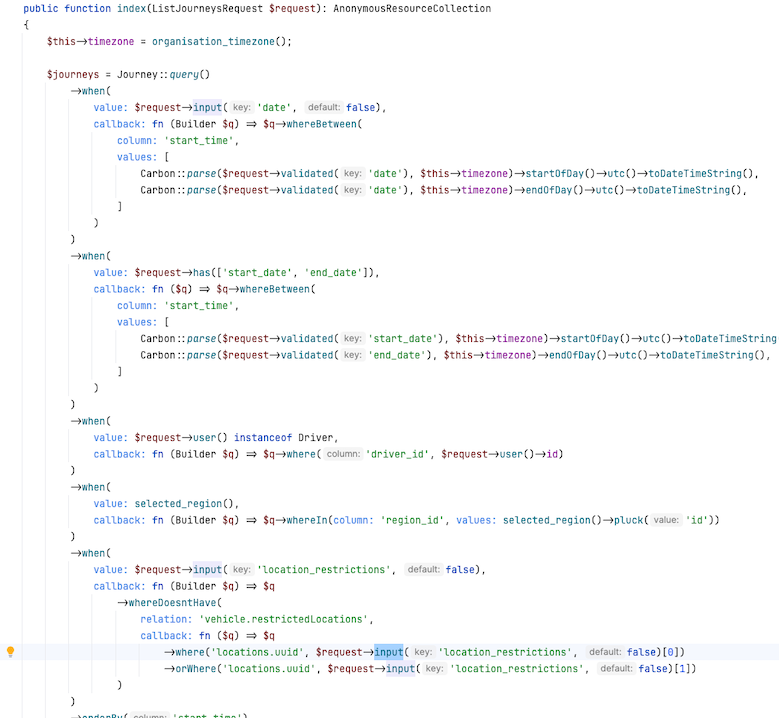Laravel Pipelines
In one of my regular code cleaning sessions I found a piece of code in our controller very similar to this picture:

It looks clean and readable, but the code just went on and on, and made the understanding of the controller code much harder than it needs to be.
In this case all I needed to know was that we have an incomin request with parameters, and we have to filter our query based on the different parameters. There is absolutely no need to keep all the implementation details in the controller.
We can extract our various filters to pipes, and send our base query through them:
class BookingController extends Controller
{
public function index(ListBookingsRequest $request): AnonymousResourceCollection
{
$bookings = app(Pipeline::class)
->send(Booking::query())
->through(pipes: [
FilterByDateRange::class,
FilterByRescheduleIdentifier::class,
FilterByGroupIdentifier::class,
FilterBySequenceIdentifier::class,
FilterByBookingFormIdentifier::class,
FilterByClients::class,
FilterByStatus::class,
FilterByTransportRequirement::class,
FilterByRegion::class,
FilterByAllocation::class,
FilterByUuid::class,
FilterOnlyTrashed::class,
OrderBookings::class,
SearchBookings::class,
])
->thenReturn()
->paginate();
return BookingResource::collection($bookings);
}
}
The problem arises when we need to pass multiple arguments to our filter classes, in our cases we need to pass the request in order to extract the filter parameters:
class FilterByDateRange
{
public function __invoke(Builder $query, Closure $next): Builder
{
return $next($query)
->when(
value: $this->request->filled('date'),
callback: function (Builder $q) {
$date = Carbon::parse($this->request->validated('date'), organisation_timezone());
return $q->whereBetween(
column: 'date',
values: [
$date->clone()->startOfDay()->utc()->toDateTimeString(),
$date->clone()->endOfDay()->utc()->toDateTimeString(),
]
);
}
);
}
}
One option is to use DTOs, constructed from the base query, and the various request fields we need.
The other option is to rely on Laravel's service container to inject the request instance to our filters.
By simply typing a FormRequest $request in our consturctor, we instruct Laravel to inject the current form request:
class FilterByDateRange
{
public function __construct(protected FormRequest $request)
{
}
//...
}
We need to use FormRequest as a type, so we have access to the validated method.
Here's our redacted form request class:
class ListBookingsRequest extends FormRequest
{
public function authorize(): bool
{
return $this->user()->can('viewAny', Booking::class);
}
public function rules(): array
{
return [
// ...
'clients' => ['sometimes', 'array'],
'clients.*' => ['sometimes', Rule::exists((new Client())->getTable(), 'uuid')],
// ...
'uuids.*' => ['sometimes', Rule::exists((new Booking())->getTable(), 'uuid')],
'date' => ['bail', 'nullable', 'string', 'max:255', 'date'],
// ...
'status_filter' => ['nullable', 'array'],
'status_filter.*' => ['nullable', 'string', 'max:255', Rule::in(BookingStatus::values())],
// ...
'transport_requirements' => ['sometimes', 'array'],
'transport_requirements.*.code' => ['required', Rule::exists((new TransportRequirement())->getTable(), 'code')],
];
}
}
There is only one problem with this approach,which we learnt the hard way. Laravel will inject a new instance of the request for every filter class instance.
For two reasons in our form request: our authorize method, and our exists and in rules.
Both the authorize method and the various rules will execute database queries for each instance of the request.
While this was a fairly obscure bug to track down, the fix is relatively easy:
class BookingController extends Controller
{
public function index(ListBookingsRequest $request): AnonymousResourceCollection
{
$bookings = app(Pipeline::class)
->send(Booking::query())
->through(pipes: [
new FilterByRescheduleIdentifier($request),
new FilterByGroupIdentifier($request),
new FilterBySequenceIdentifier($request),
new FilterByBookingFormIdentifier($request),
new FilterByClients($request),
new FilterByDate($request),
new FilterByDateRange($request),
new FilterByStatus($request),
new FilterByTransportRequirement($request),
new FilterByRegion($request),
new OrderBookings($request),
new SearchBookings($request),
new FilterByAllocation($request),
new FilterByUuid($request),
new FilterOnlyTrashed($request),
])
->thenReturn()
->paginate();
return BookingResource::collection($Booking);
}
}